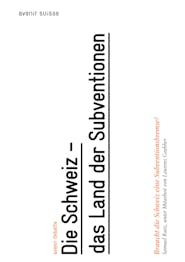The risks and side-effects of subsidies are often underestimated. In most cases only a few benefit, but the costs are shared by many. Not only that, but the costs of subsidies often outweigh the benefits: they regularly lead to deadweight and crowding-out effects, distort the markets and result in the inefficient allocation of scarce resources. In the latest Avenir Suisse study, “Die Schweiz – das Land der Subventionen” (Switzerland, the Land of Subsidies), Samuel Rutz examines the lack of awareness in Switzerland of the damage potentially caused by subsidies, and proposes six possible reforms.
Subsidies – in the EU also known as state aid – are any economic benefits that the state grants to selected companies from which they could not profit under normal market conditions. In addition to classic direct government payments, subsidies also include, notably, public-sector loans at non-market conditions, state guarantees and sureties, tax breaks, and cash infusions for insolvent or overly indebted companies.
Coronavirus Booster for Subsidies
Especially in the wake of the pandemic-related measures, subsidies have become socially acceptable again, with politicians propagating them as a knee-jerk response to all ills. While certain aspects at least of the granting of subsidies at federal level are regulated, in the cantons and municipalities it’s effectively no holds barred. There are still various subsidy regimes at cantonal level that distort competition to such a degree that they’ve long since been abolished in neighboring countries. Examples include the state guarantees for cantonal banks and tax relief for state-affiliated enterprises.
Abandoning Outmoded Practices
Subsidies don’t just often lead to market distortion. For a country that relies on as unimpeded access as possible to markets abroad, they’re also an increasing risk, with government-subsidized companies less and less welcome in many parts of the world. This includes the EU, still Switzerland’s most important trading partner, which recently published a white paper on dealing with the distortive effects on the internal market of foreign subsidies. This means that reforms are very much in Switzerland’s interests.
The following steps should be considered:
- The prerequisite for deciding on whether individual subsidies make sense is transparency. While there’s transparency in some areas at federal level, state aid at the cantonal level should be systematically recorded.
- A check on subsidies’ effects on competition, particularly at the cantonal level.
- Expiry date for subsidies (sunset provision). The disciplinary effect of this measure could also be reinforced with the “one in, one out” principle.
- No new subsidies for companies operating internationally as compensation for the upcoming implementation of the global minimum tax of 15 percent.
- No subsidy-related competitive advantages for the federal government, cantons, municipalities, and public-sector undertakings when doing private-sector business (competitive neutrality).
- If these measures do not create sufficient disciplinary pressure, the introduction of an autonomous Swiss law on state aid along the lines of the EU legislation on state aid or the UK’s Subsidy Control Bill should be looked into.





